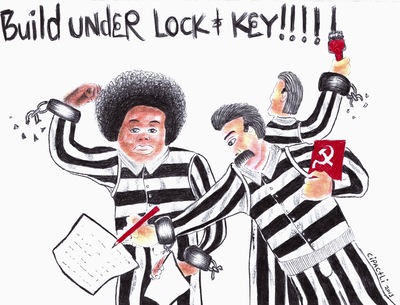
Oh, So You Woke?
Coming into the new year of 2021 with the protest, or what CBS news and other news casting platforms calls “The Assault on the Capitol,” one must look back on the past years to this pivotal point of time. Especially when it comes to the millennials and generation Z. It’s because of this age group, and to be honest it’s not even an age group of individuals but a mindset of individuals ranging from the very old to the very young, that’s making these movements on both sides of the political spectrum of the imperialist-capitalist government. Even though a lot of the individuals who started these movements like the Black Lives Matters movement and QAnon or Proud Boys are of the age of college students ranging from 18 years old to mid or late 30s. One has to pose the question of, “Where are the doctrines of these movements coming from?” One will say the government; then the next question is posed, “By what method is the government distributing these doctrines?” The answer is through these universities and colleges.
After reading the Kites Editorial Committee article, “Kick ’Em While They’re Down”: This speaks on how the U.S. “Left” views Angela Davis as a saint, like Saint Maurice of Germany. For these twitter-age revolutionaries, which for us who are true and living revolutionaries, know that these individuals are reformist, are being indoctrinated with writings and speeches like Angela Davis’s to continue the ‘We shall overcome one day, by changing the system from the inside’ mantra.
How this imperialistic/capitalistic government continues this mantra is by using a trap-door-spider tactic. Which is by taking the brightest of lumpen children out of these ghettos and barrios schools, have them come to college, where then the colleges close the door behind the lumpen child where they get entangled with the reformist state of mind. Basically stripping lumpen college students of whatever idea of making a change that doesn’t involve using the system that the imperialist government uses to control first world lumpen and proletariat in the equation.
The imperialist government is still on the COINTELPRO “Stop the rise of a Black Messiah” but the difference is it’s not just one Judas now, and when one sits down and look at those who fell into the “change the system from the inside” trap door, they will see how many Judases are out there, keeping tabs on the youth of the lumpen. The imperialistic government and those who are Judases to the struggle would rather the lumpen youths sell out for a small crumb of the capitalist/imperialist pie, than go get weapons, organize themselves and push for armed revolution. Especially in the age of social media, where one is way more than able to reach and be in contact with other like-minded individuals across this imperialist country. But also other lumpen in other imperialist countries, and would more than love to see the end of these governments that holds the world’s power currently.
The imperialist-capitalist knows this and to counter-act this worldwide united front advancement against them, they use individuals like John Lewis and Angela Davis to push the bourgeois propaganda of being a muthafucking cop to our youth. What we, who are truly dedicated to this struggle, have to give the youths who are serious about changing their circumstances, first is nationalism (either New Afrikan or La Raza Aztlán) then internationalism. Show em the truth about previous revolutionaries, their successes, their failures, and where the movement is now, and how to move forward correctly, which is to break the spell that was cast on our youth by the bourgeoisie, by the way of the University of Maoist Thought and the standard operating procedures of the United Front for Peace in Prison. So that they’ll never get jedi mind tricked by the those who claim to be revolutionaries but are really junior deputies, and reach and teach those who are like-minded the right way.
It’ll spread faster than last year’s California wildfires because the majority of the revolutionaries WE were inspired by to even join in the struggle, were all individuals 25 years old or younger. Teach the youth the truth and aid and assist them through righteous mentorship, and watch how the imperialist-capitalist nation falls.
MIM(Prisons) responds: It is true that organizations like the Panthers were predominately under 25 years old, and we would expect the next revolutionary vanguard party to be of similar demographics. But the university and the mass media are distracting today’s youth with this fake woke reformism. The new generation of the oppressed need to find themselves independently of these institutions as the Panthers did. We need more education, but we don’t need to join their institutions and take on their ideologies.
QAnon and the Proud Boys are a little different though. QAnon is not a youth movement. It is a movement of predominately older, less educated Amerikans. Both of these groups find support in the mass media via mouth pieces like Donald Trump, yet they also get support for their affront to the ideas of academia. These groups tap into sectors of the oppressor nation in a way that communists need to tap into the oppressed. They represent real social forces in a way that the interests of the oppressed are not currently being represented.










